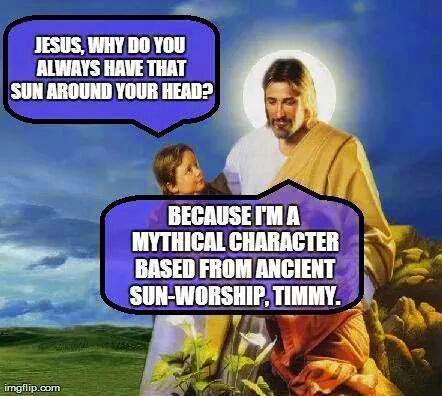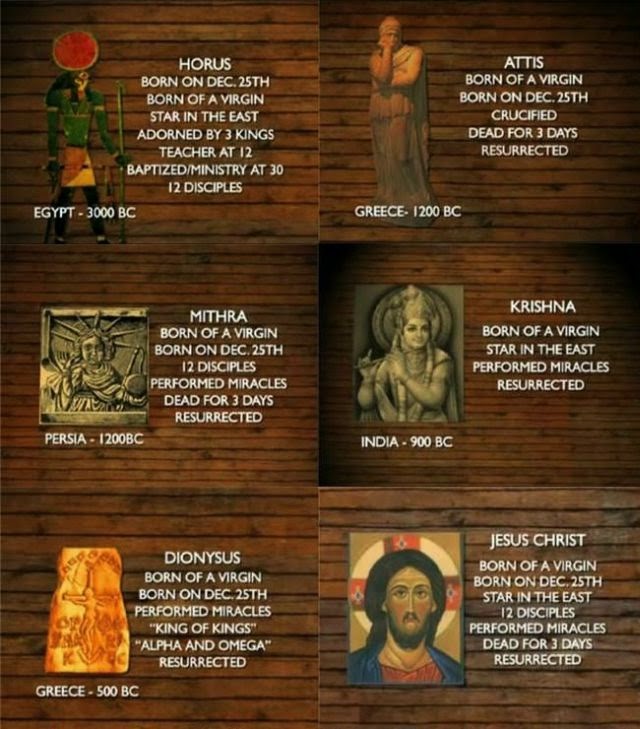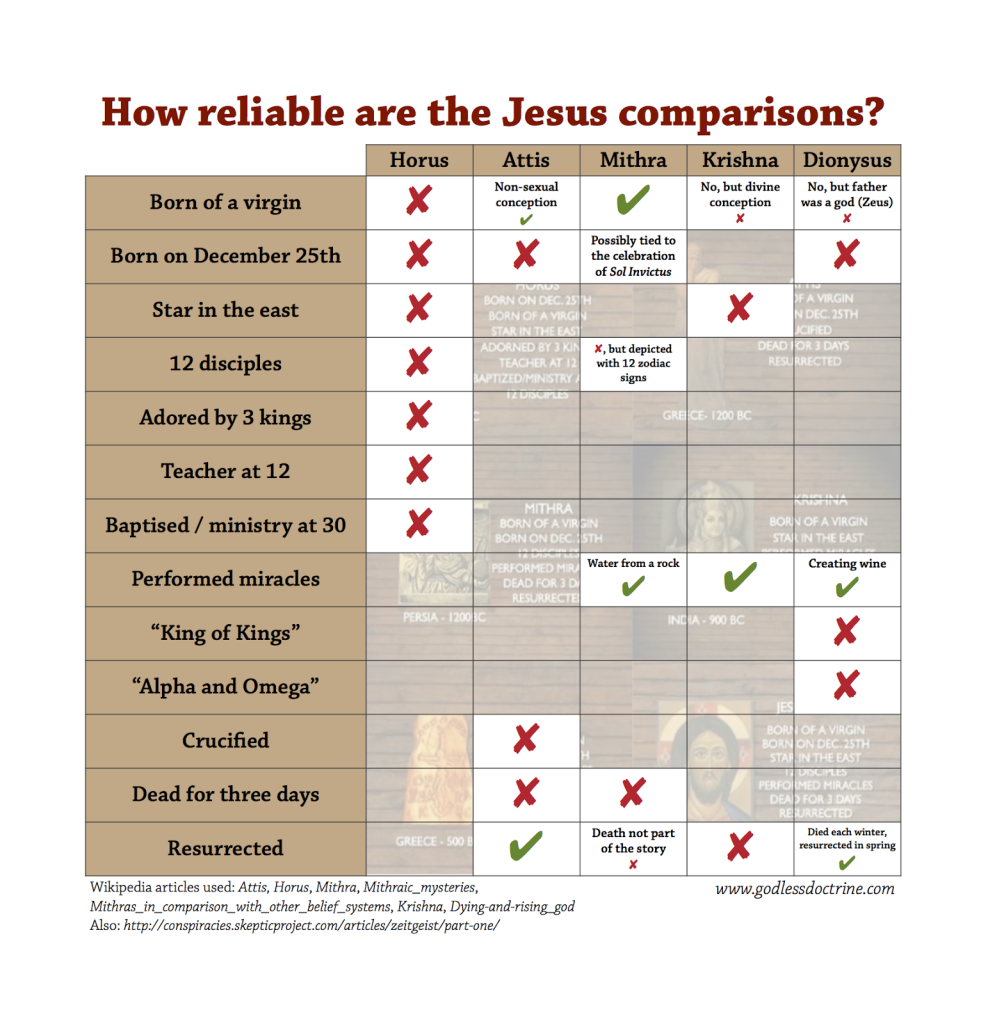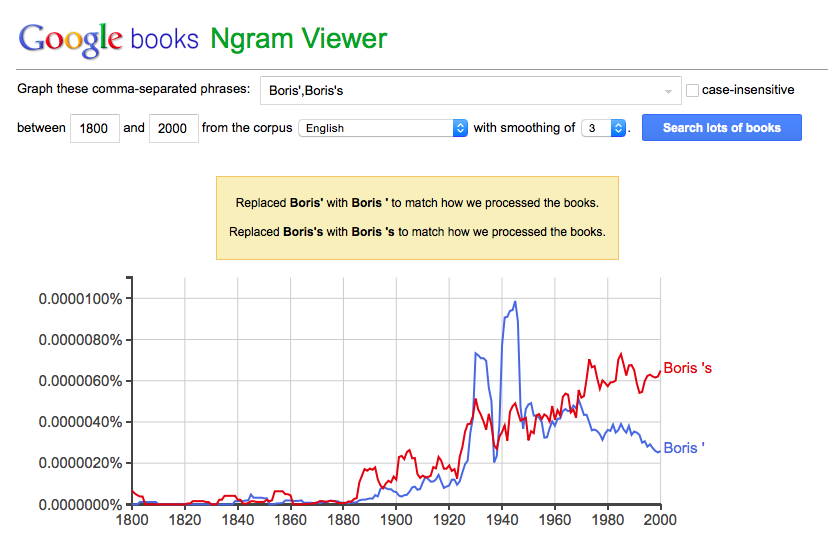“That Ye Might Believe That Jesus Is the Christ”
Isaiah 61:1–3; Joseph Smith Translation, Luke 3:4–11; John 1:1–14; 20:31
LDS manual: here
Purpose
To help readers think critically about the story of Jesus, as well as competing ideas.
Reading
After the insanity of the Old Testament, it’s finally time to study the New Testament. The NT is a fascinating story of sin and redemption, and the start of — oh, dear — yet another major world religion. God, upset that everyone sinned against him, decided not to just forgive everyone like a benevolent deity. Instead, he decided that sending his son — formerly the psychopathic bully Jehovah — down to earth to be tortured and killed would make him feel better about having a relationship with us.
In his wisdom God decided that, rather than getting Jesus to write about himself, it would be a better idea to have his plan communicated by contradictory stories cobbled together from legends, written decades after the events they discuss. This freed Jesus up to perform party tricks for his friends, and these events are recorded in the Gospels.
After spending a weekend dead, Jesus then came back to life
and instructed his apostles to spread the word. Christianity did very poorly among the Jews, who already had a religion. But once the apostles recognised the potential among the heathen, and relaxed the entry requirements, the new religion did quite well. The Acts and the Epistles show how the Apostles (particularly Paul) managed to retool Old Testament scriptures in an effort to get the Christian story straight.
Everyone thinks of the New Testament as the nice one, right? No more God killing people, and it’s all about the lurv. Well, we’re going to see that the New Testament has its share of barbarity and injustice.
It also has:
- terrible advice
- scientific inaccuracies
- rules that believers routinely ignore
and above all, loads of conflicts between the various versions of the myth.
Yes, there are cases of Jesus doing some nice things, but in rather trifling ways for very few people. Normal people can and have done much more to help mankind. A real supernatural being could do better.
Show this video from nonstampcollector.
Ask: What could a supernatural being like Jesus have done to help humanity, but didn’t? How does this make you feel about his priorities?
Main points from the lesson
Did Jesus exist?
Christopher Hitchens articulated the view that there’s no direct evidence outside the Bible for the existence of Jesus.
The idea that Jesus simply didn’t exist is not currently a majority view among bible scholars. This could be because so many bible scholars have been well-disposed toward Christianity, if not Christians themselves. This is changing, with more non-theist scholars taking an interest in the question of Jesus’s existence. One is Richard Carrier, who discusses his views here.
This recent episode of “The Thinking Atheist” has three scholars — Carrier, Fitzgerald, and Price — talking about the issue. Christians often tell me about quotes from Josephus and Tacitus as evidence for Jesus, and these scholars discuss this is the podcast as well. Very entertaining, and worth a listen.
My take: If someone named Jesus existed, it’s okay with me. Evidence for the existence of a Jesus of Nazareth would not necessarily validate the supernatural claims about him. If, however, he didn’t exist, it would obliterate those claims. I really don’t envy the Christian position here. It’s kind of like “heads, they lose; tails, they still don’t really win”.
Was the Jesus story a copy of existing gods?
It’s easy to believe that the story of Jesus was simply a remix of the stories of gods that were floating around in every culture. How could it not be? Human imagination tends to take some predictable forms. Moreover, a story will be more believable if it matches stories that people already accept.
Recently, though, some atheists have made the more direct claim that specific elements of the Jesus story were borrowed from other gods point for point. The movie Zeitgeist is one example. This graphic is a summarisation of some of its claims, but there are other similar ones.
I decided to check how well the accepted facts about these gods matched the graphic, and the short answer is: not great.
Comparisons of this nature tend to use bad sources, accept dubious near-matches (Krishna was killed by an arrow? That’s kind of like crucifixion!), and generally play things fast and loose. We have to be careful about this kind of stuff, and not accept it too uncritically.
Even though the close analysis falls down, some points of comparison do stand up: the virgin (or divine) births, miracles, and resurrections. These are elements of stories that people have told about their gods since there have been gods. It shouldn’t be surprising that they also appear in the Jesus story.
Additional lesson ideas
Doubtful goals of the atonement
This lesson features a scripture from the Joseph Smith “Translation” of Luke, in which Smith puts words into the mouth of John the Baptist. Here are the things the LDS lesson manual says Jesus was to have done.
a. “Take away the sins of the world” (verse 5).
We’ll be discussing this alleged sin-removal in Lesson 25, but for now, I’ll just ask: Why would Jesus die to remove the effects of sin, but without making any effort to prevent sin from happening? It’s a dumb method, and just one reason why this is an incoherent system.
b. “Bring salvation unto the heathen nations” (verse 5).
Christian meddling in indigenous culture has been the source of great injustice as missionaries have interfered with native languages, sexual practices, and social attitudes.
c. “Gather together those who are lost” (verse 5).
It’s condescending to teach that people who aren’t Christians are lost. People probably think I became lost when I left the Church, but I count it as gain. I gained the ability to value my limited life, to love my wonderful wife, and to allow my children to become the people they are, without the destructive and pernicious influence of religion.
d. “Make possible the preaching of the gospel unto the Gentiles” (verse 6).
The spread of Christianity, with its attendant violence, power, and control is one of the saddest stories I can think of.
e. “Be a light unto all who sit in darkness” (verse 7).
Christianity has no special claim to being “a light”. Having been a Latter-day Saint, I now try to live by the light of reason and science, and this works much better.
f. “Bring to pass the resurrection from the dead” (verse 7).
We’re all still waiting on that one. Everyone who has died is still dead.
g. “Administer justice unto all” (verse 9).
Divine justice does not really seem to be a thing.
h. “Convince all the ungodly of their ungodly deeds” (verse 9).
Ah. Now this is one that Christians have worked hard on. There seems to be no shortage of deeds that are classified as “ungodly”, or believers eager to chastise us about them.
One out of eight. That’s above their usual hit rate. Well done, fake John the Baptist.
Is the possessive Jesus’, or Jesus’s?
When I was a kid, I learned a rule about adding apostrophe -s to people whose names end in s, like James or Ross. The rule was: just add an apostrophe, but no extra -s. That worked fine for a while, but then I started noticing the extra s popping up in books. Was there a shift?
It now looks like the rule has indeed shifted. We can use Google’s Ngram Viewer to search massive numbers of books over hundreds of years, and when we do, we see that, while either one is okay, the -s variants are more popular. At least that’s true for James and Charles.
Boris has switched. No idea why. Sparse data, most likely.
But Jesus is a bit of an exception. Notice the continuing popularity of Jesus’, even today. (u/FHL88Work pointed out that Moses follows this pattern as well.)
So what should you do? Unless you’ve got some compelling reason, write Jesus’ instead of Jesus’s. That way, you’ll be in step with the overwhelming majority of writers.








4 January 2015 at 7:52 pm
Thanks for posting those two long lectures on the case for the mythical Jesus. I've always been curious as to how the argument goes, so I listened to them both — very interesting!